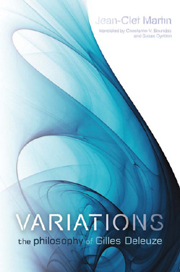Book contents
- Frontmatter
- Contents
- Letter-Preface by Gilles Deleuze
- Preambles
- First Variation: Ethics and Aesthetics
- Second Variation: Three Poetic Formulas for Nomadic Distribution
- 1 Time Out of Joint
- 2 The Dice Throw
- 3 ‘The Garden of Forking Paths’
- Third Variation: Multiplicities
- Fourth Variation: Malcolm Lowry, or, the Manifesto of Things
- Postscript to the Anglo-American Edition: What is a Multiplicity?
- Notes
- Bibliography
- Index
2 - The Dice Throw
from Second Variation: Three Poetic Formulas for Nomadic Distribution
Published online by Cambridge University Press: 12 September 2012
- Frontmatter
- Contents
- Letter-Preface by Gilles Deleuze
- Preambles
- First Variation: Ethics and Aesthetics
- Second Variation: Three Poetic Formulas for Nomadic Distribution
- 1 Time Out of Joint
- 2 The Dice Throw
- 3 ‘The Garden of Forking Paths’
- Third Variation: Multiplicities
- Fourth Variation: Malcolm Lowry, or, the Manifesto of Things
- Postscript to the Anglo-American Edition: What is a Multiplicity?
- Notes
- Bibliography
- Index
Summary
If the critique finds itself forced to change course under the constraints of a new transcendental aesthetic, the entire system of judgement to which time had to submit will break apart. ‘Every thought is a roll of the dice’: this is another formula for a new principle of distribution and a new system of judgement, whose impact snatches the constellation of a nomadic distribution from the sky. No doubt, Kant's Analytic of concepts presents itself as a systematic concern, a configuration that ‘affords sufficient guidance as to the proper location of each concept, while at the same time indicating which divisions are still empty’ (Kant 1929: A83/B109). This project, which aims to lay out the land of pure understanding, is not so difficult. There is no dispute over the purification of the soil needed to place every concept in a fixed position. Nothing is simpler than this Analytic, for the reason that it was developed as a direct result of a perfectly determinable recognition. In the last analysis, it is enough ‘to recognize the place that properly suits each concept’, assuming that the concepts are subordinated to a system of places with stable coordinates. Perhaps recognition through the concept, as the third synthesis of the imagination, is the indicator marking a concept's function – that renders its location viable. And so, recognition in the concept is the exercise of a synthesis whose function, by means of an after the fact foundation, resembles the recognition of a concept, without which ‘concepts and, therewith knowledge of objects are altogether impossible’ (Kant 1929: A104).
- Type
- Chapter
- Information
- VariationsThe Philosophy of Gilles Deleuze, pp. 79 - 104Publisher: Edinburgh University PressPrint publication year: 2010



